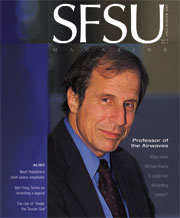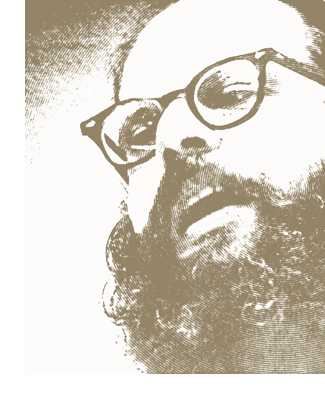 |
| |||
The Beats Go On Bald-pated and bushy-bearded, the Beat poet Allen Ginsberg is sitting cross-legged on stage at San Francisco State's McKenna Theatre. The occasion is a May 9, 1974, poetry reading and Ginsberg, then age 48, is loosening up the audience by singing a mantra that sounds as if he might be making it up as he goes along. Begin with appreciation of the place we're sitting in The 3/4-inch reel-to-reel tape on which the poet's lunchtime reading was recorded has deteriorated badly over the years, as have most of the other videotapes that make up the bulk of the Poetry Center's collection of recordings by 20th century poets. Many of the tapes are gummed up by magnetic particles; others are so brittle that the next playing could be their last. With the clock ticking, the Poetry Center has embarked on a massive project to convert each of the tapes to digital code and preserve them on disc before it's too late. "These tapes are very much endangered, but it's one of those things that we would appreciate only when they're gone and irretrievably lost," said Jiri Veskrna, the Poetry Center's part-time archives manager who is doing the preservation work almost single handedly. The project -- partly funded by grants from the National Endowment for the Arts -- is hugely labor-intensive. Veskrna must manually transfer each analog recording to his computer hard drive in real time. He then transfers the digital code to DVD. Old videotapes tend to be temperamental so the project moves along in fits and starts. The Ginsberg recording froze a few minutes into the reading as Veskrna sought to save it on a hard drive. "That's OK because I think we can retrieve it," he said. The Poetry Center started sponsoring poetry readings in 1954. In 1973, technicians began bringing cameras and microphones to these popular events -- some staged at off-campus venues -- so that they could be recorded for posterity. The first recorded reading, on Feb. 22, 1973, by the Oakland-born poet Robert Duncan, was shot in black and white on 1/2-inch reel-to-reel tape. Later formats included 3/4-inch tape followed by VHS and Hi-8 -- all fragile media that endure only several decades even under the best of circumstances. The tapes are housed on the fifth floor of the Humanities building in a temperature-controlled vault specially built for the collection. But for many years, the recordings lived in the basement of the old Humanities building, sandwiched between a boiler room and the journalism darkroom and subjected to temperature extremes and fumes from photo-developing chemicals. None of the 1,056 recordings -- the latter ones made on DVD -- would fetch much at auction. But they nevertheless constitute a precious documentation of literary history and culture. Many recordings capture poets musing aloud or joking with the audience. Others feature then little-knowns whose names are now household words -- Alice Walker, for example. The poets' words may be immortal but no recording media has yet been discovered that stands the test of time. Veskrna figures that the preservation project could consume the next couple of years, by which time the DVD may be obsolete. -- Anne Burke | ||||









 Ginsberg's delightful bit of doggerel could vanish into oblivion were San Francisco State's Poetry Center and American Poetry Archives not taking steps to preserve it.
Ginsberg's delightful bit of doggerel could vanish into oblivion were San Francisco State's Poetry Center and American Poetry Archives not taking steps to preserve it.